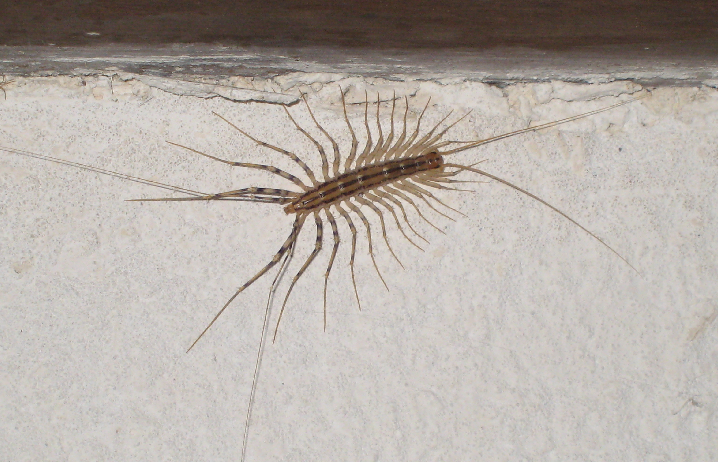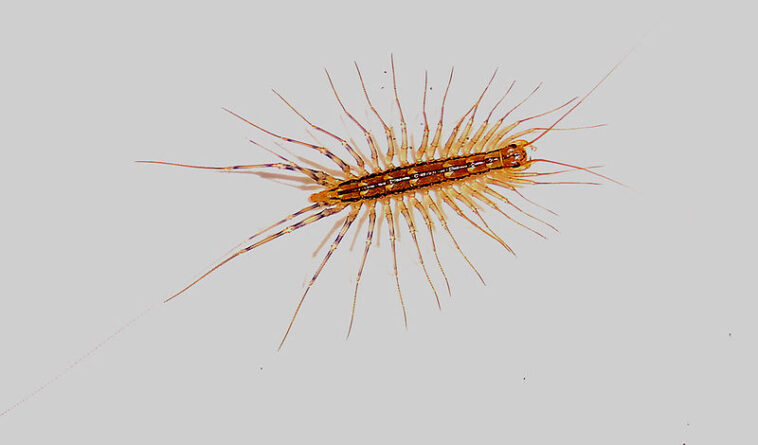Equipped with numerous pairs of legs and large antennae, swift scutigers are, as their name suggests, particularly fast. Their long beige or grayish-yellow body, up to ten centimeters long and covered in long blue, black or gray bands, needs this speed to quickly approach prey and paralyze them with a venomous bite. Due to its lucifuge nature (escape of light), it is more at night that this little predator frightens us in the corner of the bathtub or proudly enthroned on a section of wall. Like many myriapods, this centipede does not shine with its cuteness. Also, when you find scutigers in your house, you quickly wonder how to get rid of them… Wrongly? Here is everything you need to know about the presence of swift scutigers in a house and how to scare them away.
Having scutigers in your house, a positive point?
First of all, you should know that this animal is very fearful of humans, very discreet and not harmful. Nestled quietly in our baseboards, heating ducts, wall cracks or behind furniture, appliances and radiators, we generally have little chance of coming across him. It is otherwise harmless to us. In fact, it can sting and its bite is very painful because of its venom. However, it avoids contact with us and will only sting in the event of aggression, if we touch it with a bare hand. Despite its impressive appearance and size, it therefore presents no danger in case of infestation!
In addition, it is generally very appreciated in the garden, but also in the house where it feeds on all the little creatures that we try to get rid of all year round. For example, in the summer it makes a feast of all the mosquitoes, flies, crickets, bedbugs, ants, termites and wasps. It also feeds on silverfish as well as cockroaches which tend to hide in the same places as them. They are therefore not harmful parasites, quite the contrary! With these critters, we don’t have no more need for insecticides or pesticides in the garden based on chemicals.

How to chase away scutigers when they come into our house?
There’s nothing to do… Despite the fact that this beast is very useful, you don’t want to hear about it! Already know that it is possible to capture unwanted scutigers in a small box or jar to release them further. So you don’t hurt them. And to rid your homes of this intruder who is giving you cold sweats, here are other tips.
Make your home less hospitable to scutigers
The first thing to do to fight against scutigers in our interiors is to understand what attracts them there. This animal appreciates humidity and heathence his particular affection for the bathroom, the boiler room, the cellar or the garage. Like other centipedes, the scutigera breathes using respiratory pores. It therefore does not tolerate dry air well, causing its dehydration and death by desiccation. Also, you will first have to ensure that you combat humidity in your interior at all costs. For example, check your VMC, install an air dehumidifier and use the range hood frequently when cooking. Also hunt for water leaks and ventilate your interior well.
Remove their food sources by pest control
You can remove prey from this natural insecticide on legs. Without insects, and therefore without food, the scutigers will be thus less attracted to your house. Natural solutions exist to eradicate cockroaches, silverfish, flies and mosquitoes which are the delight of these predators.
Diatomaceous earth to get rid of it
This powder can be sprinkled in all places of passageon firewood, and the holes and gaps through which the scutigers pass. (You can also simply block them to prevent them from passing through!) And to treat walls and less accessible places, dilute 300 to 500 g of powder in 1l of water. Then transfer to a spray bottle for easy application. Use this homemade product on the areas to be treated. After the water evaporates, the diatom particle remains attached to the wall and protects it from passages. By crawling on this powder, the scutigers will dehydrate. To avoid any risk of inhalation, wear a mask when using this powder.


